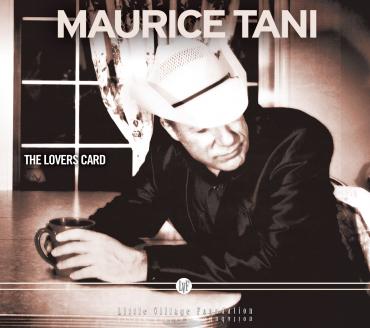
I have been reviewing Maurice Tani cd’s for the past three years. Maurice was brought to my attention by his publicist Tanya Pinkerton who had read a few of my reviews in No Depression. I was immediately impressed with Maurice Tani’s voice, song writing and his his approach to a genre that I called “country noir” only to discover other reviewers had also arrived at that same description. I have changed my opinion about that characterization “country noir” because its too limiting when it comes to describing Maurice’s music. It’s like Tom Russell doesn’t like to have his music or his song-writing described as “Americana.” That just means what Russell does can’t be put into any category except one that is used for anything that isn’t mainstream.
Maurice is much the same way. He writes material that sound like country at times and like classic American standards on occasion. The difference is Maurice’s smooth tenor voice and his songs. This unique combination attracted Jim Pugh, the highly respected keyboard player who has toured with Etta James, Robert Cray and most recently with the legendary Syl Johnson in Japan. Pugh started the Little Village Foundation, a non-profit that searches out and discovers, records and produces music that may be as limited as only have been heard by family and neighbors to music that hasn’t made it beyond the communities that they live in. In Maurice’s case that commuity is the Bay Area.
Pugh says what interests him are musicians who he believes can change lives an perspectives – he has seen how music can have a powerful impact if it can reach an audience. His Little Village label works primarily with West Coast artists who are continuing the regions blues traditions such as John Blues Boyd, Chris Cain and Dave Ellis. He also has recorded Mexican American music from the valley including Xochitl Morales and Los Tres Amigos.
Pugh has known Maurice since his early days playing bass with Roy Loney and the Phantom Movers. By the end of the nineties, Tani shifted gears and decided to try his hand at singer songwriter using country flavored backdrops for his lyrics. It has been a successful transition and the framework for his lyrics are picture perfect. Maurice calls it a “cinema for the blind.” Scott Bloom wrote that “This music is neither retro nor country, it’s twang noir. A fully realized universe on a dark night, with an AM station sending out a strong signal from somewhere down Highway 99.” Maurice describes his characters as “small time gangsters who still feel small for not making their mark.” In one of his new songs “Take me with You (When You Go Too Far)” his male character is in a dingy apartment at night listening to his girlfriend pace upstairs “dragging her baggage around …
…making plans to move on.
I’ve seen you try it before but it’s yet to work out
every road leads somewhere but you havent found
the right route. I’ve watched you soar too high,
plunge too deep, sell too cheap.
I don’t care where your bound
but I need to cover some ground.
My bag is pack in your car. I don’t care where you go
take me with you when you go too far.”
Intrigued with the direction Pugh convinced Tani wto take a batch of his material to Kid Andersen’s Greaseland Studios and the three of them produced “The Lover’s Card” in just three sessions, recording all ten track live including the vocals and solos in single takes. The result in my estimation is his best cd to date. The songs range from blues (“Something to Hide”) to George Jones country (“Falling”) to his own country noir (Three Small Words”)
When I spoke with Pugh he said “Maurice gets it. He understands how to take the past and rethink the old folk singing of the 50’s and tap into the golden age of country music. He knows the singer songwriter world is a croweded field.” Pugh went on to talk about the difficulty of musians making the big time after the age of 30. “Most people have all the blues records they’ll ever buy at a certain point.” He went on to say that there are two kinds of musicians that Little Village can’t help: “those who don’t know where their next meal is going to come from. And those musicians who want to become the next big deal.” Tani and I talked about the future and for the time being he’s content to work on exposing his music and songs to a wider audience and playing a steady schedule of live performances around the Bay Area.
One song on “Lovers Card” sums up the dramatic leap forward that Maurice Tani has made with this record. One of my favorite Tani compositions is “New Dress” which has been sung with extraordinary effectiveness by Pam Brandon. This time around Pugh had Tani sing his own song as it builds to a crescendo that raises the hair on the back of your neck.
It was a new day
at the edge of town
She pulled up to the sign by the
light of the rising sun
And with a new brush
and some old paint
She lowered the population
by one.
Maurice Tani is in good hands and will continue to make his own unique music. It’s not about “making it” that energizes Tani. It’s about shedding some light on the petty lives or herioc characters trying to make it day to day and putting those lives in a beautiful setting.




